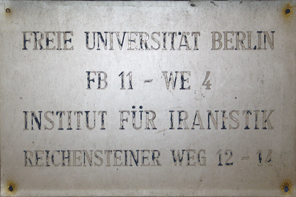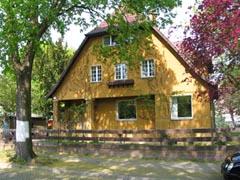Institutional History (1970 to date)
Plate of former residence of the Institute for Iranian Studies, Reichensteiner Weg (until 2004)
Image Credit: Claudius Naumann
Institute of Iranian Studies, Schwendenerstr. 17 (2004-2015)
Image Credit: Claudius Naumann
After Colpe’s appointment the Seminar of Iranian Philology parted ways with the Seminar of Indian Philology and in 1970 moved into its own building in Reichensteiner Weg 12-14, once again in Berlin-Dahlem. Following the structural reforms of the Freie Universität (FU) in 1970, it was located within the newly created faculty of “Philosophie und Sozialwissenschaften” and in the course of the 1970s renamed “Institut für Iranistik” to take account of the discipline’s changed profile. As part of the restructuring, Farhad Sobhani was offered a chair in 1972 on the grounds of his merits as a teacher of Persian and expert on the Bahai religion. Thus, alongside Iranian philology and the history of religions, a New Iranian Studies branch developed, thanks also to Richard Flower and Fakhrezzaman Schirazi, who joined the Institute in 1970 and 1971 as PhD candidates with a focus on modern Persian literature. Kurdish Studies were launched in 1978, with Jemal Nebez and, from 1984, Feryad Omar acting as tutors. In 1979, Maria Macuch became a lecturer in the new research area of legal history.
When in the winter term of 1974/75 the FU extended the definition of the Dogmatics chair in the department of Protestant Theology to include the study of non-Christian religions, Carsten Colpe redefined his own chair as “General History of Religions and Historical Theology” and, with this novel Religious History job title, changed over to the department of Protestant Theology. In 1980, the big faculty “Philosophie und Sozialwissenschaften” was split up into two. Both retained the old name and were henceforth distinguished by adding the Roman numerals “I” and “II”. The Institute of Iranian Studies was attached to “Philosophie und Sozialwissenschaften II”, the compound of the so-called minor disciplines (Ethnology/Social and Cultural Anthropology, Islamic Studies, East Asian Studies, Protestant Theology, Religious Studies, Catholic Theology, Jewish Studies and, incorporated at a later date, Turkish Studies).
In 1983, the chair that had been left vacant by Carsten Colpe was advertised, in accordance with the needs of the subject and time, with a special emphasis placed on the history and culture of Islamic Iran. The appointment of Bert Fragner from Freiburg i.Br. in 1985 helped fortify the New Iranian Studies branch. Birgit Hoffmann became a lecturer in the field in 1986.
The research conducted by Fragner in Berlin was, on the one hand, a continuation of the work of the Freiburg ‘historical school’, represented by Hans Robert Roemer, which focussed on the so-called inšā literature, the Persian diplomatics and palaeography, and produced several learned studies about Persian historical documents. Fragner himself published a number of papers on these issues (e.g., Persische Memoirenliteratur als Quelle zur neueren Geschichte Irans, Wiesbaden 1979; Repertorium persischer Herrscherurkunden. Publizierte Originalurkunden bis 1848, Freiburg 1980). On the other hand, Fragner established a new research area in Middle Asian Studies to explore different aspects of the Iranian and Islamic development in Transoxiana during the modern era (cf. “Sowjetmacht und Islam. Die Revolution von Buchara”, in: Festschrift für Hans Robert Roemer, Wiesbaden/Beirut 1979, pp. 146-166). He also worked on the economic and social history of Iran, on Iran’s development towards an Islamic theocracy and on the question of a specific Iranian identity (e.g., “Social and Economic Affairs of Timurid and Safavid Iran”, in: Cambridge History of Iran, vol. 6, 1986, pp. 491-567; “Von den Staatstheologen zum Theologenstaat: Religiöse Führung und historischer Wandel im schiitischen Persien”, in: WZKM 75, pp. 73-98; “Historische Wurzeln neuzeitlicher Identität: zur Geschichte des politischen Begriffs ‘Iran’ im späten Mittelalter und in der Neuzeit”, in: Studia Semitica necnon Iranica, Wiesbaden 1989, pp. 79-100). And in a research project funded by the Deutsche Forschungsgemeinschaft (DFG), Faramarz Behzad started compiling a German-Persian dictionary in 1986.
In 1989, Fragner was offered and accepted the newly created chair of New Iranian Studies in Bamberg. The fall of the Berlin wall in the autumn of that same year, and the unification of the two German states in 1990, opened up a world of undreamed-of opportunities to cooperate with colleagues and institutions in East Berlin. At Humboldt University, Manfred Lorenz read Iranology with a focus on the modern age. In the former GDR’s Academy of Sciences, Werner Sundermann worked in the Turfan research group which engaged in the edition and interpretation of primary sources found in Chinese Turkestan in the early 20th century. This spectacular discovery of a great number of Middle Iranian texts and fragments has virtually revolutionised Middle Iranian Studies in the course of the past hundred years and has brought to light new languages that were still unknown in the 19th century. Thanks to the fortunate fall of the wall, it became possible for us to secure the cooperation both of Manfred Lorenz, noted for his Persian textbook, his Pašto grammar and further important works on modern Iranian languages, and of Werner Sundermann, whose outstanding contribution to Turfan research makes him one of the most renowned Iranologists of the world. Sundermann became one of the first scholars from the former GDR to be appointed adjunct professor of the FU in 1992, and until 2006 he regularly taught courses at the Institute of Iranian Studies. Manfred Lorenz kindly gave regular courses at our Institute during the 1990s as well, until, in the wake of a general austerity policy, the faculty imposed a spending freeze on teaching appointments in 2003. As part of the so-called Scientists Integration Programme (Wissenschaftler-Integrationsprogramm, WIP), Iris Colditz, who also came from the Academy (which had been renamed “Berlin-Brandenburg Academy of Sciences and Humanities” in the meantime), joined the Institute as a PhD candidate in 1993. Sundermann and Colditz helped re-establish Manichaeism as a proper research field, which had been neglected after Colpe’s departure (cf. e.g. Iris Colditz: Zur Sozialterminologie der iranischen Manichäer. Eine semantische Analyse im Vergleich zu den nichtmanichäischen iranischen Quellen. Wiesbaden 2000 [Iranica 5]).
In 1995 Maria Macuch, having been awarded a junior professorship in 1991 and succeeded David Neil MacKenzie at Göttingen’s Georg-August-Universität in 1994, was appointed to Fragner’s chair. By that time, it was already clear that municipal cost-cutting measures would require reducing the Institute’s existing three chairs, once Sobhani and Gobrecht would have retired, to just one. The chair was therefore advertised as covering Iranian Studies in general, i.e. traditional research on pre-Islamic Iranian languages and cultures as well as new approaches to the culture and history of the Islamic period. The Institute’s main areas of research all belong to these two core aspects of Iranian Studies. Professor Macuch teaches and studies both, her interests centring upon the history of language, law and literature. In the realm of legal history, her books include editions of Zoroastrian-Sasanian source texts, philological analyses of the legal terminology and specific legal syntax as well as contributions to the reconstruction of the Zoroastrian legal system and its influence on Jewish, Nestorian-Christian and Islamic jurisprudence. In the realm of literary history, Macuch has concentrated on the metaphorical language of classical Persian literature and on Sufi poetry. See also her full list of publications.
The lectureship in Islamic Iran was first held by Monire Parsia-Parsi from 1995, and then from 1999 by Maryam Mameghanian-Prenzlow. Götz König holds the lectureship since 2005. Michael Pohly was accepted as a PhD candidate in Modern Afghan Studies in 2000, while Dieter Weber (1999-2001 and again from 2004), Alberto Cantera (2001-2003), David Buyaner (since 2010), Miguel Ángel Andrés-Toledo (since 2010), Iris Colditz (since 2012) sowie Benjamin Jokisch (since 2012) pursued third-party (i.e., DFG) funded research at the Institute (see Projects and Research).
When in 1999 FU faculties were again restructured and enlarged, the Institute for Iranian Studies became part of the "Fachbereich Geschichts- und Kulturwissenschaften" (“Department of History and Cultural Studies”).
Commencing the summer term 2004, the Institute of Iranian Studies gave up its domicile in Reichensteiner Weg, where it had resided for more than 30 years, and moved to Schwendenerstr. 17 in Berlin-Dahlem.
In 2015 the Institute of Iranian Studies moved again, now to a new building for the smaller institutes of the department in Fabeckstr. 23-25.
Following the retirement of Maria Macuch in 2015, Alberto Cantera was appointed to the Chair of Iranian Studies in 2016. Also in 2016, two PostDoc positions were filled with Arash Zeini (2016-2020) and Shervin Farridnejad (2016-2022).



